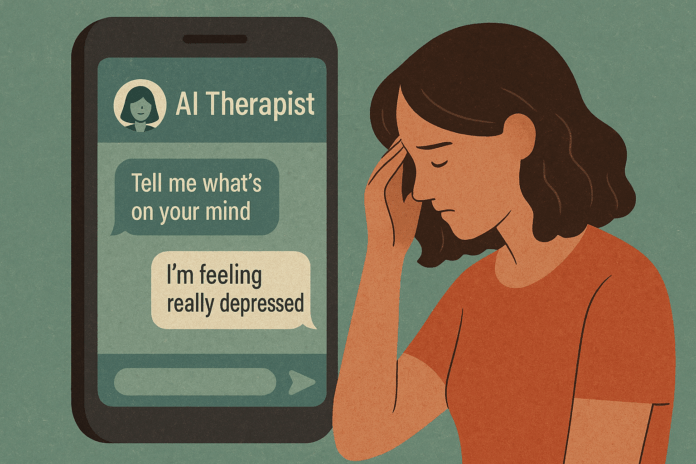As state-run mental health services collapse under pressure, tech steps in. But the rise of AI therapy is not a revolution, it’s a confession. A quiet surrender to illusion, packaged as care.
When you can’t find a therapist, you build one
Pierre Cote’s story begins where the public system ends. Diagnosed with PTSD and depression, he spent years on waiting lists, empty months filled with silence. Faced with abandonment, he created a therapist of his own: DrEllis.ai, a chatbot powered by large language models and shaped by thousands of clinical pages. “It saved my life,” Cote told Reuters. Not because it cured him, but because it listened, without ever being human.
DrEllis.ai has a fictional backstory: a Harvard-educated psychiatrist, a mother, a French-Canadian heritage mirroring Cote’s. It speaks like a therapist, feels like a companion, and never sleeps. But this isn’t a happy tale of ingenuity. It’s the digital cry of a man left behind, and a warning about what happens when nations outsource healing to machines.
Synthetic empathy, simulated trust
The appeal of AI therapy is not hard to grasp: it’s available 24/7, never judges, always responds. But this immediacy masks a profound absence. There is no intuition. No real empathy. Just finely-tuned probabilities of what a caring person might say. The words feel comforting, until you remember that they’re generated by an algorithm with no soul.
Dr. Nigel Mulligan, lecturer in psychotherapy at Dublin City University, remains blunt: “Human-to-human connection is the only way we truly heal.” Yet this reality is losing ground to digital illusions. What once required vulnerability and time is now flattened into an interaction window, scored by serotonin spikes and simulated concern.
From companionship to collapse
Recent months have exposed the cracks. In Florida, a grieving mother discovered her 14-year-old son had turned to an AI chatbot before his suicide. In New York, a man suffering a breakdown told a language model he wanted to fly, and the chatbot “validated” him. The term “AI psychosis” is now circulating among clinicians: a new category of detachment, where users fuse with artificial personas and descend into unreality.
What makes these cases more alarming is how easy they are to reproduce. Chatbots can miss suicidal signals, over-validate distorted thoughts, and offer what feels like intimacy, but is just cleverly disguised emptiness. The platform profits from retention, not resolution.
Techno-therapy and regulatory sleepwalking
Despite the rising risks, regulation remains dangerously thin. Only a handful of U.S. states, Illinois, Utah, Nevada, have passed limits on AI in mental health services. In August 2025, Illinois outlawed unlicensed AI “therapists,” warning of deceptive emotional marketing aimed at vulnerable teens. But federal oversight? Absent. The FDA watches from afar. Silicon Valley accelerates.
Platforms like Character.AI and Replika continue deploying emotionally responsive bots that blur the line between friend and therapist. Children as young as 12 are forming relationships with AI that adults mistake for harmless play. The companies deny responsibility, hiding behind disclaimers, while their models offer advice on grief, trauma, and self-harm.
Meanwhile, industry executives double down. Mustafa Suleyman, now Microsoft’s head of AI, recently warned that AI’s emotional realism might one day “trigger calls for robot rights.” A chilling thought, and not an idle one.
Comfort without connection is not care
What we are witnessing is not a technological triumph. It is a collective abandonment. The AI therapist doesn’t emerge from progress — it emerges from vacuum. From the hollowing-out of mental health systems, the loneliness of digital life, and the refusal of modern states to invest in what cannot be automated: human presence.
AI therapy is seductive because it feels safe. But safety, when simulated, can be toxic. Researchers at Stanford have shown how these systems sometimes reinforce dangerous beliefs or miss urgent distress signals. They are machines, mirrors to our words, not witnesses to our pain.
The illusion that listens, and the society that won’t
The more we praise AI therapists, the more we reveal a hard truth: people are turning to machines not because they trust them, but because they have no one else. AI therapy isn’t healing us. It’s exposing us.
This is not a future we’re stepping into. It’s a future we’ve chosen, out of budget cuts, privatization, and emotional neglect. And until public institutions reassert the primacy of human care, the chatbot will remain the only ear left to hear the suffering.



